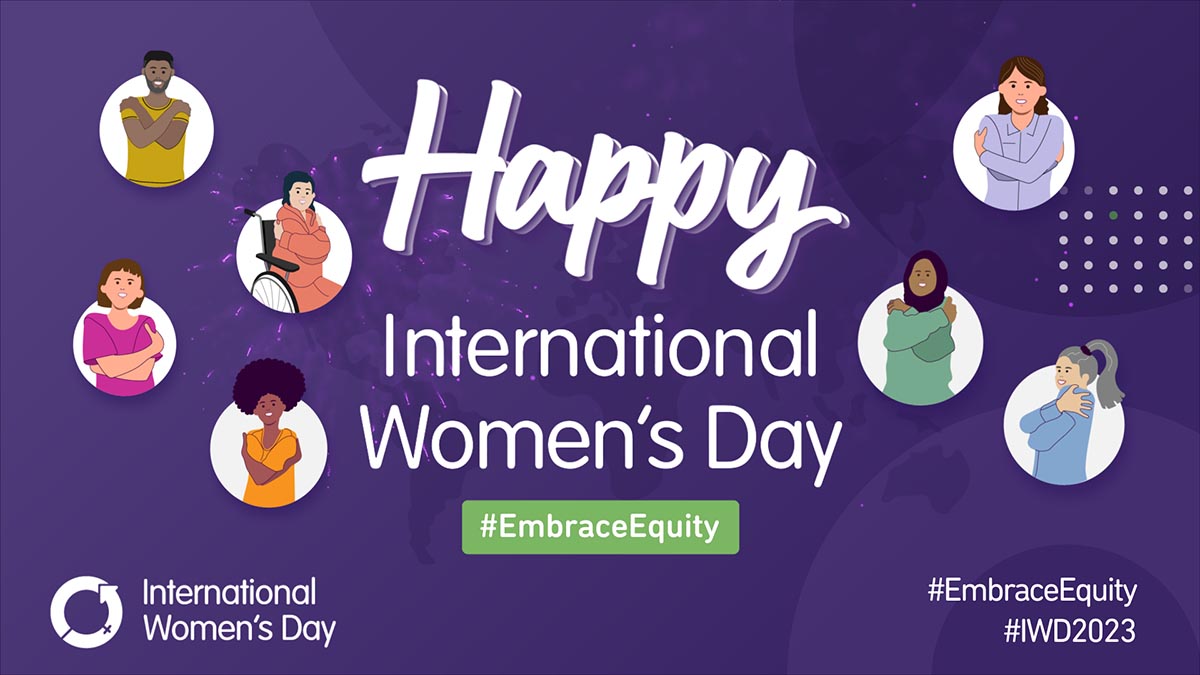#EmbraceEquity this International Women’s Day
Today marks International Women’s Day.
This year’s International Women’s Day theme – #EmbraceEquity – aims to draw clear distinctions between often conflated inclusionary terms, whilst simultaneously reminding communities across the world that a world free of gender bias is both possible and realistically achievable.
Here at Renaix, we see IWD as an opportunity to shout about the pioneers and visionaries in finance who are doing the work, day in, day out, to create a more equal world.

Photo by InternationalWomen’sDay2023
What Does #embraceequity Mean for Year’s International Women’s Day?
As per IWD’s announcement:
- “The aim of the IWD 2023 #EmbraceEquity campaign theme is to get the world talking about why equal opportunities aren’t enough. People start from different places, so true inclusion and belonging require equitable action”.
A major part of IWD2023’s mission is to redefine what equality and equity means, both in the workplace and outside of the workplace, to create a more equal world.
This year, a major component of IWD has been encouraging not just equity for women, but overall gender equity and gender parity “within our own sphere of influence” – making sure everyone is empowered and knowledgeable enough to make targeted, effective change where it will make the most impact directly in the communities we work and live in.

Photo by ThisisEngineering RAEng, on Unsplash
What Is the Difference Between “equality” and “equity”?
Again, we lean on the IWD team to summarise the differences between these terms, and why it matters so much that neither term is misconstrued.
- “Equality means each individual or group of people is given the same resources or opportunities. Equity recognises that each person has different circumstances, and allocates the exact resources and opportunities needed to reach an equal outcome”
Why does this matter?
Well, in short, not every person needs exactly the same sort of support, mentoring, teaching, guidance or opportunities to become a fully-fledged, happy person. Also, by clearly defining these important terms, it’s an acknowledgement that not all equally offered opportunities are context-based, fair, or indeed relevant to individuals or related to their upbringing, livelihoods or culture.
- “Equity can be defined as giving everyone what they need to be successful. In other words, it’s not giving everyone the same thing. If we give everyone the same thing, expecting that will make people equal, it assumes that everyone started out in the same place – and this can be vastly inaccurate because everyone isn’t the same”.
Embracing Equity Is the Right Thing to Do
As IWD and many, many others assert, equity is clearly the right way ahead. Within work and professional cultures, embracing equity is a clear commitment to improving inclusionary behaviours and cultures and sits at the forefront of positive change.
Understanding and improving equity ensures employees, stakeholders and business advocates (by their employees, customers or service users) can tangibly see and experience a sense of belonging.
It’s morally, attitudinally and (as we’ve highlighted many times before) financially the absolute right thing to do, and the facts prove it:
- “Companies with more than 30 percent women executives are more likely to outperform companies where this percentage ranged from 10 to 30”.
- “In the case of ethnic and cultural diversity, our business-case findings are equally compelling: in 2019, top-quartile companies outperformed those in the fourth one by 36 percent in profitability”.
- “OECD research has found that high levels of inequality may impact growth negatively”.
- “The Eurofund estimates closing the gender employment gap will increase EU GDP by 2.8%”.

Photo by Christina @ wocintechchat.com, on Unsplash
Equality and Global Communities – How Equity Helps the Movement of Talent
There are many ways equity helps the movement of talent around the world, especially in dynamic industries such as finance, accounting and at senior management level.
From employer branding messaging to community outreach and representation, building recruitment strategies focused on equitable talent acquisition is vitally important and an industry must have.
For example, focusing on adapting and personalising L&D, creating more equitable knowledge pools, skills development and career support on a case-by-case basis to make sure every employee can succeed and grow – are some of the most effective tools at an HR department’s disposal for successful hiring.
But within industries such as finance, where, sadly, female and minority representation at leadership level has been considerably lacking, equity is more than building staffing strategies. There has to be a fully-fledged cultural shift towards better inclusion, improved visibility, less gender bias within the workplace, less abuse or marginalisation of communities, and better pathways to career growth.
In short, the “movement” of talent (be it from job to job, or region to region) is predicated on how that movement manifests.
Is it easier, or harder, for women and minorities to access opportunities based on existing hiring strategies, employer branding and network advocacy? Simply put, is the equity of opportunity in any given company actually visible and does it work to better gender parity?
This should be the first question any recruiter or business leader asks themselves when thinking about talent outreach.
How Will You Embrace Equity?
Equitable hiring strategies and techniques are easy to find (there is a shed load of advice online!) but impacting real organisational change is difficult.
It takes time, a lot of collaborating stakeholders across your organisation, leadership and (sometimes) making hard decisions, such as changing entire processes which, until now, have seemingly worked.
Improving equity of opportunity is manifested through making key changes such as the following:
- The way careers are communicated,
- How transparent those processes are,
- Leadership and mentoring availability,
- Performance management,
- Pay equity,
- Building psychologically safe workplaces,
- And the constant reaffirmation of Diversity, Equity and Inclusion (DEI) principles from recruitment and onboarding to C-suite decision making
There are, again, myriad ways a company can make these changes real such as:
- Employee resource groups,
- Working with specialist DEI recruiters,
- Incorporating external DEI audits,
- Closing the gender pay gap,
- Committing to gender balancing executive leadership teams
- PR and marketing outreach
- And funding of charities – on and on the list goes.
What’s critical for companies – especially ones with legacy issues with representation and “closed door” policies of hiring – is making the change visible, making it consistent and making it authentic. The last thing anyone needs is stop-gap policies of loose “change management” that do nothing to improve long-term representation.

Photo by Jud Mackrill, on Unsplash
Gender Equity and Finance
Finance has not been traditionally the best in offering equitable opportunities for women or minorities. But the tides are changing.
- “Though the percentage of men and women entering the field is roughly equal, men typically rise to the top faster than women do…on the bright side, there is a greater focus on improving diversity, and the overall percentage of women joining VC, PE, and hedge fund firms is rising”.
There are, as studies show, some deep-seated cultural issues at the heart of finance that are slowly being eradicated: peer-to-peer “banter” that “finance isn’t a woman’s job” and sexist generational hangovers from the 50s; the dropout of female learners at post-grad and beyond level; the lack of equal representation in finance faculties at prominent schools.
All of these pain points are, to different degrees, being met with new cultures of learning and support, for example:
- There are, at the Governmental level, policies aimed at improving representation in Finance – the Women in Finance Charter is a major example.
- There are awards – such as the Women in Finance Awards and the WIBF’s Awards for Achievement – that aim to draw awareness to the incredible work women are doing in the sector.
- Other, critical bodies are drawing battle lines against poor practice – the ONS’ Gender Pay Gap reporting is the most famous example, as are Statista’s reports on gender pay gaps such as this one on the “financial and insurance sector in the United Kingdom (UK) in 2022”.
- Major publications and yearly reports – such as the Times’ Top 50 Employers for Gender Equality, Finextra’s Top 25 financial services employers for women, and Inhersight’s The 20 Best Finance Companies to Work For, As Rated by the Women Who Work There – offer some much-needed context for contemporary working environments and who is leading the way in the equity stakes.

Photo by CoWomen, on Unsplash
The Bottom Line
This International Women’s Day, it’s right that we continue to:
- Highlight poor gender diversity practice within the HR sector,
- Challenge unconscious bias and elevate people of different backgrounds.
- Host events, be community-minded, invest in our local workforce, encourage new people into work, drive achievements in our sectors, and raise awareness for those maligned and forgotten by society
- Acknowledge equity is different to equality, and how support for women and minorities in finance especially is personalised so no one is left behind and we can all benefit and enact positive change.
To find out more about a career in finance, please visit our resources pages here or search for finance roles here.
Similar posts:
Mind the Gender Pay Gap – The Important Role of Recruitment Firms, How to Break the Glass Ceiling in 4 Easy Steps
Job Seekers
On the hunt for your next role? Upload your CV below and we’ll be in touch to discuss your requirements.
Employers
For employers seeking the right skills and cultural fit for your business, send us your vacancy to find out more about how we can help.
Submit CV Send Us Your VacancySearch Jobs
Popular this week
- What Qualifications And Skills Are Needed To Be An Accountant?
- How Does Industry 4.0 Differ From The Previous Generation?
- Agile For Accountants: Six Steps To Provide Necessary Tools And Relevant Processes
- What Are The Main Differences Between ACA and ACCA?
- What Are The Top Five Financial Accounting Facts For #AccountantsDay